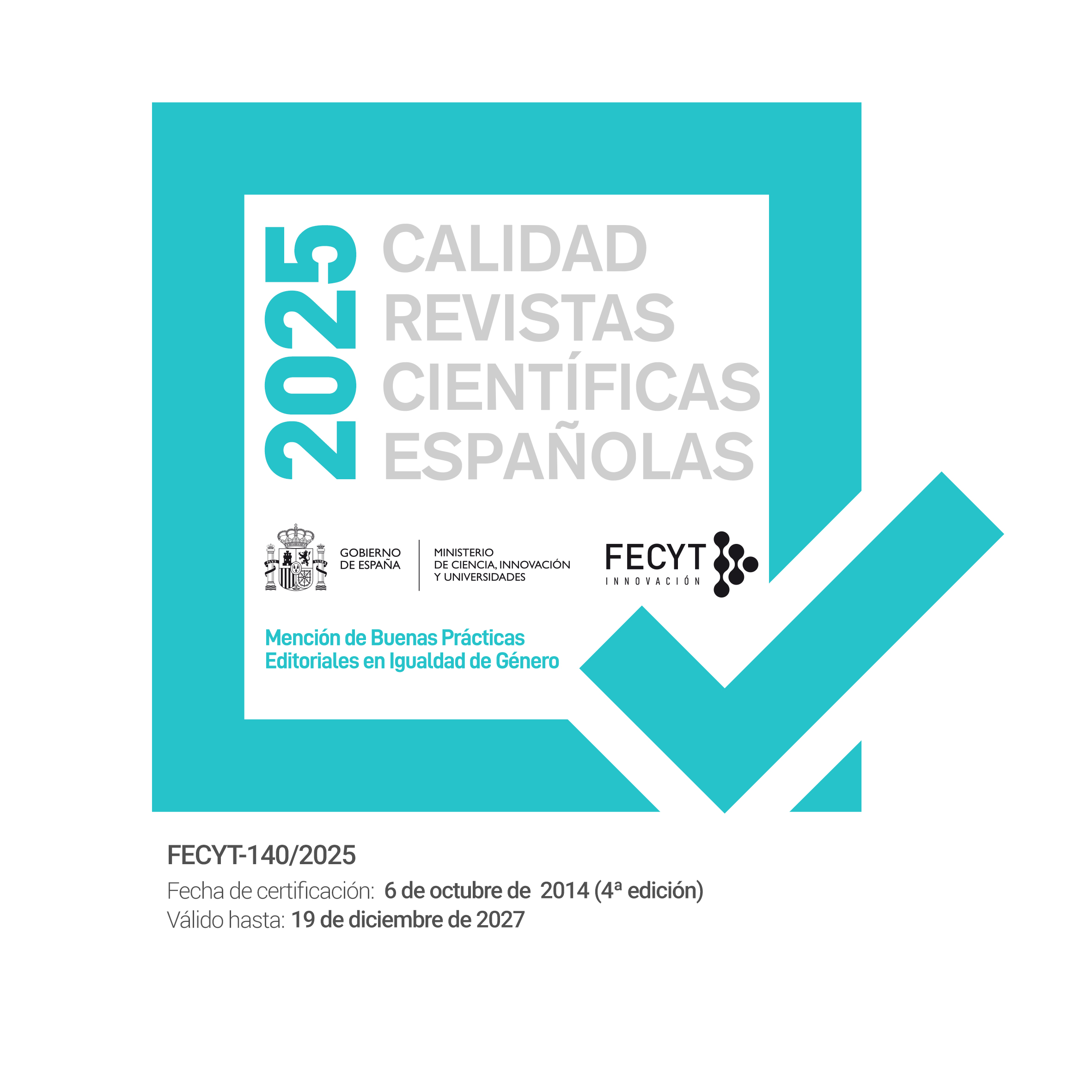Efectos del contenido de meta docente y la regulación motivacional académica sobre la creencia de eficacia docente del profesorado en formación inicial
DOI:
https://doi.org/10.5944/educxx1.23672Palabras clave:
Metas en la docencia, aspiraciones, auto-eficacia docente, formación del profesorado, profesor estudiante.Resumen
Introducción: Basado en la Teoría de la Auto-Determinación, el objetivo del estudio fue examinar la relación entre los contenidos de meta y la creencia de la eficacia docente en profesorado en formación inicial, considerando el rol mediador de la regulación motivacional académica (autónoma y controlada) al inicio y final del master de formación del profesorado. Método: Los participantes fueron 379 profesores/as en formación inicial (180 hombres y 199 mujeres; Medad = 25.30, DT edad = 4.21) quienes completaron medidas de contenidos de meta en la docencia y regulación motivacional académica al inicio del máster en formación del profesorado (toma 1), así como medidas de regulación motivacional y creencia de eficacia docente al final del máster (toma 2). Las relaciones predictivas hipotetizadas fueron examinadas vía análisis de ecuaciones estructurales. Resultados: El modelo de ecuaciones estructurales mostró que los contenidos de meta intrínsecos al inicio del máster de formación del profesorado tuvieron un efecto positivo directo sobre la creencia de la eficacia docente al final del máster, estando dicha relación mediada por la motivación autónoma académica al inicio y al final del máster. En cambio, los contenidos de meta extrínsecos al inicio del máster de formación del profesorado mostraron un efecto directo y negativo sobre la creencia de la eficacia docente al final del máster. Discusión: Los resultados obtenidos subrayan la relevancia del contenido de meta en la explicación de la naturaleza dinámica de los procesos motivacionales relacionados con la creencia de eficacia docente durante el programa inicial de formación docente del profesorado en formación inicial.
Descargas
Citas
Bandura, A. (1999). Social cognitive theory of personality. In L.A. Pervin & O.P. John (Eds.), Handbook of personality: Theory and research (pp. 154–196). New York, NY, USA: The Guildford Press.
Bruinsma, M., & Jansen, E.P.W.A. (2010). Is the motivation to become a teacher related to pre-service teachers’ intentions to remain in the profession? European Journal of Teacher Education, 33(2), 185–200.
1080/02619760903512927
Burgueño, R. Sicilia, A., Alcaraz-Ibañez, M., Lirola, M.-J., & Medina-Casaubón, J. (bajo revisión). Analysing the aspirations to become a teacher: Development and psychometric assessment of the goal contents for teaching scale. Contemporary Educational Psychology.
Burgueño, R., Sicilia, A., Medina-Casaubón, J., Alcaraz-Ibañez, M., & Lirola, M.-J. (2019). Psychometry of the teacher’s sense of efficacy scale in Spanish teachers’ education. The Journal of Experimental Education, 87(1), 89-100. 10.1080/00220973.2018.1423542
Burgueño, R., Sicilia, Á., Medina-Casaubón, J., Alcaraz-Ibáñez, M., & Lirola, M.-J. (2017). Academic motivation scale revised. Inclusion of integrated regulation to measure motivation in initial teacher education. Annals of Psychology, 33(3), 670–679. 10.6018/analesps.33.3.249601
Clark, S., & Newberry, M. (2019). Are we building preservice teacher self- efficacy? A large-scale study examining teacher education experiences. Asia-Pacific Journal of Teacher Education, 47(1), 32–47.
1080/1359866X.2018.1497772
Duncan, M.J., Eyre, E.L.J., Bryant, E., Seghers, J., Galbraith, N., & Nevill, A.M. (2017). Autonomous motivation mediates the relation between goals for physical activity and physical activity behavior in adolescents. Journal of Health Psychology, 22(5), 595 –604. 10.1177/1359105315609089
Fokkens-Bruinsma, M., & Canrinus, E.T. (2012). Adaptive and maladaptive motives for becoming a teacher. Journal of Education for Teaching, 38(1), 3–19. 10.1080/02607476.2012.643652
Hennessy, J., & Lynch, R. (2017). “I choose to become a teacher because”. Exploring the factors influencing choice amongst pre-service teachers in Ireland. Asia-Pacific Journal of Teacher Education, 45(2), 106–125.
1080/1359866X.2016.1183188
Kaldi, S., & Xafakos, E. (2017). Student teachers’ school teaching practice: The relation amongst perceived selfcompetence, motivation and sources of support. Teaching and Teacher Education, 67, 246–258. 10.1016/j.tate.2017.05.019
Kasser, T., & Ryan, R.M. (1993). A dark side of the American dream: Correlates of financial succes as a central life aspiration. Journal of Personality and Social Psychology, 65(2), 410–422.
1037/0022-3514.65.2.410
Kasser, T., & Ryan, R.M. (1996). Futher examining the american dream: Differential correlate of intrinsic and extrinsic goals. Personality and Social Psychology Bulletin, 22(3), 280–287. 10.1177/0146167296223006
Kim, H. (2012). A study on passion for teaching, teacher motivation, and teacher-efficacy of Korean early childhood preservice teachers. The Journal of Korea Open Association for Early Childhood Education, 17(6), 249–275.
Kim, H., & Cho, Y. (2014). Pre-service teachers’ motivation, sense of teaching efficacy, and expectation of reality shock. Asia-Pacific Journal of Teacher Education, 42(1), 67–81. 10.1080/1359866X.2013.855999
Kline, R.B. (2015). Principles and practice of structural equation modeling (4th ed.). New York, NY, USA: The Guilford Press.
Klug, H.J.P., & Maier, G.W. (2015). Linking goal progress and subjective well-being: A meta-analysis. Journal of Happiness Studies, 16, 37–65. 10.1007/s10902-013-9493-0
Lee, J., & Turner, J. (2017). The role of pre-service teachers’ perceived instrumentality, goal commitment, and motivation in their self-regulation strategies for learning in teacher education courses. Asia-Pacific Journal of Teacher Education, 45(3), 213–228. 10.1080/1359866X.2016.1210082
Lee, J., & Turner, J.E. (2015). A structural equation model of preservice teachers’ perceptions of future goals and current course-related motivation. Japanese Psychological Research, 57(3), 231–241. 10.1111/jpr.12082
Lee, W.C., Chen, V.D.-T., & Wang, L.-Y. (2017). A review of research on teacher efficacy beliefs in the learner-centred pedagogy context: Themes, trends and issues. Asia Pacific Education Review, 18(4), 559–572. 10.1007/s12564-017-9501-x
Marsh, H.W., Hau, K.-T., & Wen, Z. (2004). In search of golden rules: Comment on hypothesis-testing approaches to setting cutoff values for fit indexes and dangers in overgeneralizing Hu and Bentler’s (1999) findings. Structural Equation Modelling, 11(3), 320–341. 10.1207/s15328007sem1103
Ntoumanis, N., Healy, L.C., Sedikides, C., Duda, J., Stewart, B., Smith, A., & Bond, J. (2014). When the going gets tough: The “why” of goal striving matters. Journal of Personality, 82(3), 225–236. 10.1111/jopy.12047
Organización para la Cooperación y el Desarrolo Económico. (2014). New Insights from TALIS 2013. Teaching and learning in Primary and Upper Secondary Education. Paris, France: OECD Publishing.
1787/9789264226319-en
Pop, M.M., & Turner, J.E. (2009). To be or not to be... a teacher? Exploring levels of commitment related to perceptions of teaching among students enrolled in a teacher education program. Teachers and Teaching: Theory and Practice, 15(6), 683–700. 10.1080/13540600903357017
Preacher, K.J., & Hayes, A.F. (2008). Asymptotic and resampling strategies for assessing and comparing indirect effects in multiple mediator models. Behavior Research Methods, 40(3), 879–891. 10.3758/BRM.40.3.879
Ryan, R.M., & Deci, E.L. (2017). Self-Determination Theory: Basic psychological needs in motivation, development, and wellness. New York, USA: Guilford Publications. 10.7202/1041847ar
Ryan, R.M., & Deci, E.L. (2019). Brick by brick: The origins, development, and future of self-determination theory. In A.J. Elliot (Ed.), Advances in Motivation Science (pp. 111–162). Cambridge, MA, USA: Academic Press. 10.1016/bs.adms.2019.01.001
Shrout, P.E., & Bolger, N. (2002). Mediation in experimental and nonexperimental studies: New procedures and recommendations. Psychological Methods, 7(4), 422. 10.1037//1082-989x.7.4.422
Sibley, B.A., & Bergman, S.M. (2016). Relationships among goal contents, exercise motivations, physical activity, and aerobic fitness in university physical education courses. Perceptual and Motor Skills, 122(2), 678–700.
1177/0031512516639802
Tschannen-Moran, M., & Hoy, A.W. (2001). Teacher efficacy: Capturing an elusive construct. Teaching and Teacher Education, 17(7), 783–805.
1016/S0742-051X(01)00036-1
Vallerand, R.J., Blais, M.R., Brière, N. M., & Pelletier, L. G. (1989). Construction et validation de l’échelle de motivation en éducation (EME). Canadian Journal of Behavioural Science, 21(3), 323–349.
1037/h0079855
Viladrich, C., Angulo-Brunet, A., & Doval, E. (2017). A journey around alpha and omega to estimate internal consistency reliability. Annals of Psychology, 33(3), 755–782. doi:10.6018/analesps.33.3.268401
Wang, J., Hefetz, A., & Liberman, G. (2017). Applying structural equation modelling in educational research. Cultura y Educación, 29(3), 563–618.
1080/11356405.2017.1367907
Zee, M., & Koomen, H.M.Y. (2016). Teacher self-efficacy and its effects on classroom processes, student academic adjustment, and teacher well-eing: A synthesis of 40 years of research. Review of Educational Research, 86(4), 981–1015. 10.3102/0034654315626801
Publicado
Cómo citar
Número
Sección
Licencia
Derechos de autor 2019 Educación XX1

Esta obra está bajo una licencia internacional Creative Commons Atribución-NoComercial 4.0.
La revista Educación XX1 se publica bajo licencia Creative Commons Reconocimiento-NoComerciaL 4.0 (CC BY-NC 4.0). Se permite la generación de obras derivadas siempre que no se haga un uso comercial. Tampoco se puede utilizar la obra original con finalidades comerciales.










